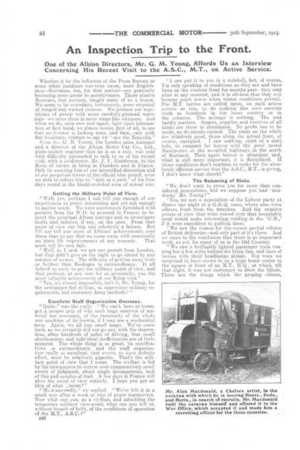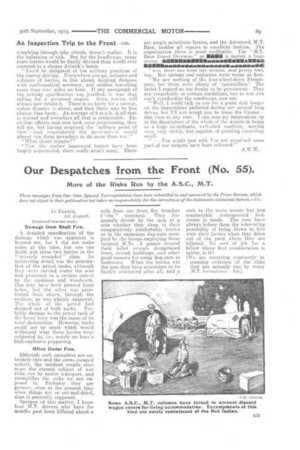An Inspection Trip to the Front.
Page 8

Page 9

If you've noticed an error in this article please click here to report it so we can fix it.
One of the Albion Directors, Mr. G. M. Young, Affords Us an Interview Concerning His Recent Visit to the A.S.C., M.T., on Active Service.
Whether it be the influence of the Press Bureau or some other insidious war-time cause, most Englishmen—Scotsioen, too, for that matter—are gradually becoming more prone to secretiveness. Those elusive Russians, last autumn, taught many of us a lesson. We Seem to be nowadays, fortunately, more sceptical of winged and wicked rumour. We preface our repetitions of gossip with more carefully-phrased warnings—we utter them in more stage-like whispers. And when we do, once now and again, light upon information at first band, we glance round, first of ail, to see that no Censor is lurking near, and then, only with -fine hesitancy, venture to say we "saw the Zeppelin."
Even _Nil.. G. M. Young, the London sales manager and•a director of the Albion Motor Car Co., Ltd., plain-spoken engineer that he is as a rule, was only with difficulty persuaded to talk to us of his recent visit; with a co-director, Mr. J. F. Henderson, to the fleets of lorries in being in Flanders and in France. Only by assuring him of our intensified discretion and of Our perpetual terror of the -official blue pencil, were we able to induce him to " spin us a yarn" of his four days round in the khaki-crowded area of actual war.
Getting the Military Point of View.
" Well, yes, perhaps I can tell you enough of our experiences to prove interesting and yet not enough to matter much. We were courteously furnished with permits from the W.D. to proceed to France, to inspect the principal Albion convoys and to investigate faufts and failures, if any, on the spot. From that point of view our trip was relatively a failure, But I'll not tell you more of Albions' achievements over there than to say that we came away with practically no .hints fdr improvements of any moment. That must tell its own tale.
as I said, we got• our permit from -London, hut that didn't -give us the right to go ahead by any manner of means. The difficulty of getting away from or further than Boulogne is extraordinary. It all helped us early to get the military point of view, and that perhaps, at any rate for us personally, was the most valuable achievement of our flying visit."
" Yes, it's almost impossible, isn't it Mr. Young, for the newspaper-fed civilian, to appreciate military requirements and necessary Army methods? "
Excellent Staff Organization Overseas.
"Quite," was the reply. "We can't, here at home, get a proper grip of why such huge reserves of material are necessary, of the immensity of the whole war machine, of its inertia, if I may Use a mechanical term. Again, we all buy small maps. We've come back. as we certainly did not go out, with the impressioni;after hundreds of miles of driving, that small shorteomings and individual inefficiencies are of little moment. The whole thing is so great, its ramifications ,o extraordinary, and the staff organization really so excellent, that errors, to have definite effect, must be relatively gigantic. That's the military point of view that I mean. The civilian is fed by the newspapers to sorrow over comparatively small errors of judgment, about single incompetents, lack of this and surplus of that. A.few days in France will alter the noint of view entirely. I hope you get an idea of what I mean?"
Mot asseredly," we replied "We've felt it in a sniall way after a week or two of peace manceuvres. Now what can you, as a civilian, and admitting the temporary military view-point, what can you tell us, without breach of faith, of the conditions of operation
of the KT.,. A.S.C.? • }336
"I can put it to you in a nutshell, but, of course, I'm only speaking of conditions as they are and have been on the western front for months past—they may • alter at any moment, and it is obvious that they will become much worse when winter conditions prevail. The M.T. lorries are called upon, on such active service as this, to do nothing like such onerous work as hundreds in the home country or in the colonies. The mileage is nothing. The cost hardly matters. Spares, supplies and reserves of all kinds,;-are there in abundance. No profit has to be made, no dividends earned. The roads on the whole are relatively good, those along the actual front, of course, excepted. I saw nothing, short of a shell • hole, to compare for horror with the palm': round Manchester or the so-called highways in the north of Scotland. Then again labour is abundant and, , what is still more important, it is disciplined. If those conditions. don't combine to make for the absolutely efficient service that the A.S.C., M.T., is giving, I don't know what should."
The Balancing of Risks.
"We don't want to press you for more than considered generalities, but we suppose you had 'incidents,' Mr. Young ?"
"Yes, we met a deputation of the Labour party at_ dinner one night at a G.H.Q. mess, where also were , officers fresh from the trenches. And the relative points of view that were voiced over that hospitable meal would make interesting reading in the 'C.M.,' if it were expedient to publish them. "We saw the reason for the recent partial release of British deliveries—and only part of it's there. And we came to the conclusion that there is as important work, as yet, for many of us in the Old Country. " We saw a brilliantly-lighted passenger tram running hut a few miles behind the firing line, and lines of lorries with their headlamps ablaze. Nor were we surprised to have shown to us a huge bomb crater in the square in front of an M.T., H.Q., at which, till that night, it was not customary to draw the blinds. These are the things which the groping citizen, stumbling through inky streets, doesn't realize. It is the balancing of risk. But for the headlamps, many more lorries would be finally ditched than would ever succumb to a chariCe Aviatik's bomb.
" You'd be delighted at the military precision of the convoy driving. Everywhere you go, columns and columns of lorries, in line ahead, keeping distance with mathematical accuracy, and seldom travelling more than nine miles an hour. If any paragraph of the subsidy specification was justified, it was that calling for a governed engine. Army lorries will always now retain it. There is no hurry for a co.nvoY, unless disaster is about, and then there may be less chance than haste. An average of 9 m.p.h. is all that is wanted and nowadays all that is permissible. Excivilian officers and men to-ok some accustoming, they tell me, but having acquired the 'military point of view '—and remembered the governor—it would almost vex them nowadays to do more than ten!"
" What about repairs?"
"Now the earlier impressed lorries have been largely superseded, there really aren't many. There
are ample substitute lorries, and the Advanced, M.T. Base, tackles all repairs in excellent fashion. The organization there is most creditable. The "MT. Base Depot Overseas" atmang is merely a huge stores. Iiiiii111111111111M111111iiiiiiM111.11111111ANIIIIIN 11111111111111hiiiiiiiinsimminhimegliimii "les, there has been tire trouble, and pretty bad, too. But springs and radiators were worse at first.
"We Saw nothing of the four-wheel-drive Frenchmen, but there were :plenty. of ',caterpillars.' The latter I regard as too freaky to be permanent. They are remarkable in certain conditions, but in war you
can't •standardize the Conditions, you see. .
"Well, I could talk to you for a great deal longer on the impressions gathered during our several long drive, but I'll not-tempt you to tease the Censor,this time at any rate. I can •sum my impressions up in the description of the whole of the armies•in.being as a huge co-ordinate, well-oiled •machine, moving very, very slowly, but capable of grinding exceeding small.
A.W.W.






















